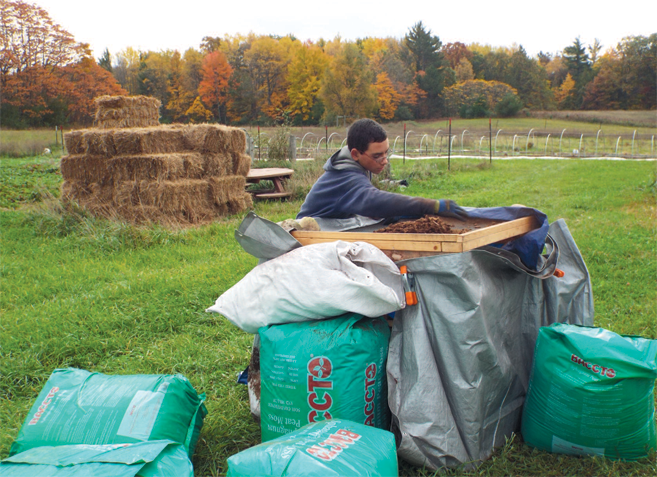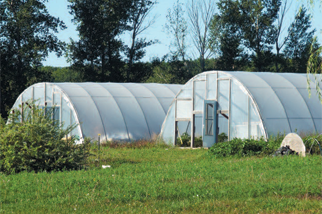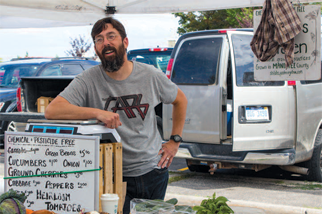Shiloh's Gardens
The ebb and flow of foot traffic at the Sara Hardy Farmers’ Market is particularly intense between 9 and 10 AM on any given Saturday. As a woman who walks with a cane, I have to be very careful where I stop to take a photograph, and so I survey the area and make sure of my footing. This ritual came in handy as I approached the tent that houses Shiloh’s Garden. I stopped in the river of people and just watched.
There stood the farmer, with one of his children, amidst an array of organic vegetables, neatly stacked and organized, colorful and inviting and looking succulent. The stall was lovely to behold.
So I noticed that.
What really struck me, though, was the joy. The happiness on the farmer’s face as he interacted with his customers shone through his eyes and his smile and I could not help but be drawn in by the quietly friendly man.
“The name Poirier means ‘pear tree’ in French,” Russ Poirier tells me, when I ask how to pronounce his name. (Try pwa-yair.) I am standing behind the tables in the stall, trying to talk to him to schedule an interview, but also trying to stay out of his way and let him do his job.
While bagging up some carrots and tomatoes for a customer and directing his helper to take their money, Poirier mentioned that they do things a little differently and that he would welcome the chance to talk about that. He also seemed like he was wincing a little, like he hurt somewhere. I asked him about it and he glossed over the details of what was obviously a pretty serious injury.
We set a date and time to talk, exchanged some pleasantries, then I merged back into the flow of people, clutching my gluten-free donuts and my big camera bag.
When we do finally sit and talk, the conversation is interesting and far reaching.
Russ and his wife, Kate, have been farming for nine years. Parents of four, they wanted to be with their family full time so he left his job as a credit manager and began to grow vegetables. Having no real experience with being market growers, they found a dizzying array of information on the subject of small farming.
They did know one thing: They knew that they had very strong principles of sustainability as their foundation, and that the way they chose to start a farm would be based on their ideals.
First, no petroleum. They did not want any gas or oil to be put in or around the soil of their farm.
Second, no debt—this from the credit manager! Poirier knew that the cost of agricultural machinery would mean that his farm would be in hock for the foreseeable future.
“For us, debt is not sustainable. We knew early on that we did not want to farm with a bunch of bright green tractors running over our land. It just wasn’t us. We want to be able to pay our bills without having thousands of dollars of machinery we could not pay for.”
So, by choice, they embarked on a size and type of farm that they and their kids could manage using hand tools and hard, hard work.
“The name ‘Shiloh’ means ‘peace bringer’ in Hebrew,” Kate tells me in an email. “We never really thought of ourselves as FARMERS, with all that that entails, usually cows and big barns and tractors and overalls. It feels more like a really intense big backyard garden to us, and gardening is hopefully more of a peaceful family enterprise, which was what we were going for, back at the start.”
They learned by doing, and were forced by the realities of farming in Manistee County to abandon their first set of ideas on organic agriculture in favor of other methods that they found through extensive reading and study. The couple attended small farming conferences and talked to many other farmers and experts. Their thinking evolved, their work changed, and they worked their fannies off. They figured it out because they had to figure it out.
Near the beginning of their intensive gardening, Russ injured his back. He ruptured two discs. He learned to live, and farm, in terrible pain, trying everything he could to manage but finally, in August 2016, his doctor gave him the news: It was time for surgery. They got through their biggest and best summer ever, and then in December 2016, he had the now three discs repaired. He got out of the hospital on Christmas day. His doc has told him it will be almost two years before he is really through his recovery. He is in what he calls “healing” pain. In the meantime, he farms.
He tells me that his children were the backbone of the farm for all these years.
“I could not do this without my kids. They have been the real hard workers for a while. Our older two have moved into their own lives now, but still contribute when they can. Our oldest son does construction, and that really helps around a farm. Our younger two, now 16 and 17, are integral to the working of our farm. Especially since my surgery.”
I ask about the tools they use, thinking that maybe they use horses or other animals, imagining the Shiloh’s Garden equivalent of an Amish style of farming.
“The only animals we have or raise are the chickens, who have a great life on our farm.”
I must have sounded quite incredulous. Wait, you farm without any animals to help you, and, you have serious back problems? How do you do it?
“We use mostly two hand tools. We use a broadfork, and we use a tilther, a tool we learned about from studying the work of organic farmer and writer Eliot Coleman. A tilther is a wooden framed roto-tiller that uses a drill for power.” Coleman’s elegant design turns the top three inches of soil into a fluffy layer of tilth, combing together compost and soil to prepare a bed for planting.
“This post-op year is a test year for us. We are finding out what we can still do, or do differently, so that we can keep going, doing what we love to do.”
The Poiriers grow using two 30-foot by 45-foot greenhouses, and six low tunnels that produce hundreds of pounds of tomatoes. Those tomatoes go to stores and to chefs in some of Traverse City’s best restaurants, and to the three different markets that Shiloh’s Garden is a part of each week. On Saturdays, Kate takes produce to the market in Frankfort, and Russ handles the Sara Hardy market in Traverse City. Russ also sets up at the Wednesday Sara Hardy market.
“Our tomatoes and our eggs are our best sellers. Having the support of chefs like Eric Patterson at The Cooks’ House and stores like Burritt’s assures us that we can sell our tomatoes. They are beautiful and tasty so they are great in a restaurant setting. People come back week after week to get our eggs, and they tell us these are the most delicious eggs they’ve ever eaten. We can sometimes sell 30 dozen eggs in an hour.”
What makes those eggs so special?
“We think there are two reasons. One, we live next to an old quarry, and we had to drill pretty deep to get to water. Our water is very mineral rich, and the chickens drink that water. It makes their shells very strong and their taste richer. The chickens also get any leftovers from our other endeavors.”
This is their third pillar of sustainability: no waste. What they do not sell is either donated to Goodwill’s food pantry or dehydrated. Kate dries as many of their leftovers as she can, and those dried vegetables, as well as winter crops, are sold at their winter market stand in the Mercato. She makes soups and mixes that need only water to bring them back to life. If anything remains at that point, it goes into the pen of the 150 chickens that are the stars of Shiloh’s Garden.
They also rely on minerals in their soil.
“A healthy soil makes better-tasting vegetables. We make our own soil mixes and potting soils. We get organic compost from another farm every two years. The soil is our priority and then the way we farm also helps.
“Our beets and carrots are available until late harvest, and we also have an interesting vegetable specialty. We have had great success in growing sweet potatoes, which is not typically considered a Northern Michigan crop. Our’s just thrive here.” They harvested over 700 pounds of sweet potatoes last year.
I loop back to the hard work and question of “Is all of it worth it, are they making it well enough to keep going?”
“Some wanna-be-farmers will pick up Mother Earth News or other magazines and dream of starting a market farm. I just keep in mind a saying that another farmer wanted to put on a shirt: ‘Farming Ain’t for Sissies.’ This is hard. We are making it work, and, the market days make it worth it.”
This is the third time I have heard him say something like this during our interview. I ask, “What do you mean?”
“We have nothing but the highest esteem for our regular customers. The same people, week after week, come and get their food from us. That relationship, that knowledge of our place in people’s lives, that is so satisfying ... that is why we do it. We are so thankful for them.”
I know right then that this is the impetus, the balm. The customers, those faces that smile back at him, they are the reason he gets up and faces the pain every day. The connection the Poiriers feel to the land and the devotion they feel to their patrons transform the difficulties into gratefulness – the fourth pillar of their ideals of sustainability. They do this for a reason, and that is what I saw shining out through Russ’s eyes, as I paused in front of the stall piled high with stacks of produce, all the colors of the rainbow, shining in the sun.







